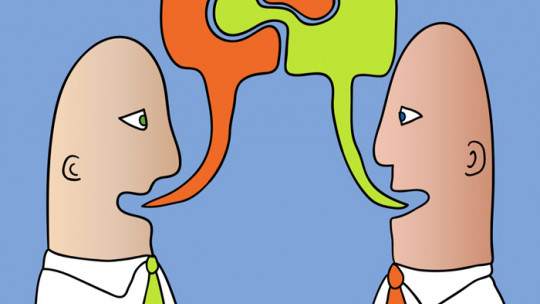
Communication skills: the three characteristics of an efficient communicator
In consultations, therapists often find that the happiest and most satisfied people have three specific relationship skills. Don’t be discouraged if you or your partner aren’t very good at these. communicative skills What we are going to comment on. We are rarely born with the gift of communication, but rather they are skills that need to be learned and practiced.
1. Empathy
Empathy refers to being able to put yourself in another person’s shoes and understand their experience and point of view, so that the interlocutor can gain an appreciation of how they feel. Of course, you also have to be able to convey your ideas to that person accurately so that the other person can access that same understanding about their situation.
Most couples have difficulty with empathy for a simple reason: They believe that they already know what the other person feels or thinks simply because they have been in a relationship for several years Countless studies demonstrate the imperfection of this assumption: we are poor predictors of what others think, even about our partners. Our assumptions are almost always biased or wrong.
Empathy requires a mental trick: close your eyes and literally imagine being the other person. Put yourself in your perspective, your reality, your priorities, your expectations, your prejudices and your concerns. Only then should you introduce the current pressing situation into the scene and then imagine how the other person perceives the situation and how you would feel in that position.
Empathy is a crucial skill in communication and human relationships, and it is also related to the next essential skill.
2. Emotional Validation
When your partner is angry or upset with you, the last thing you want is to add to that upset by telling them that they have every right to feel that way. But when you convey what happens from an attitude of sympathy and understanding, everything changes. Instead of inciting sadness or anger, his message of emotional validation It can really defuse the conflict.
Why does this paradox occur?
Emotional validation is something we all seek and crave, usually much more than we think. When we are upset, angry, frustrated, disappointed or hurt, what we most want is for our partner to understand why we feel that way.
We want them to validate our feelings, conveying their opinions with a generous helping of sympathy When that happens, the relief and catharsis we experience are enormous. Next, we can achieve authentic liberation from lower instincts and begin to express some of the feelings we have accumulated, releasing tensions and returning to expressions of affection.
Emotional validation and empathy are hugely important relationship skills. These are complemented by the third skill on our list.
To learn more about emotional validation, you can read: “Emotional validation: 6 basic tips to improve it”
3. Honesty and respect
Couples constantly underestimate The impact small gestures of consideration have on the dynamics of your relationship A nice gesture or sign of affection can almost instantly stop a tense and negative dynamic and return the relationship to a good channel for positive and emotional communication.
Obviously, giving a bouquet of flowers or giving a hug cannot reverse the depth of a wound. But when things get tense, courtesy, goodwill and affection are very powerful weapons against tension, impatience and negativity.
These three relationship skills go hand in hand. Together they form a foundation of affection, trust and connection that couples can return to more easily when they find themselves in times of stress, tension or emotional distance. It is up to each person to make an effort to practice them, improve on them and integrate them into their daily thinking and communication. Communication skills can also be learned: cheer up, they will be of great help to you.








